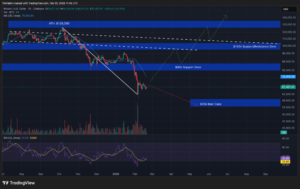Last updated:
 Why Trust Cryptonews
Why Trust Cryptonews
Ad Disclosure
We believe in full transparency with our readers. Some of our content includes affiliate links, and we may earn a commission through these partnerships. Read more

Guangzhou’s Municipal Financial Work Committee issued an action plan on Friday, January 3, 2025, to advance the adoption of the digital yuan, focusing on expanding its application in daily transactions and public services.
According to the announcement, the plan outlines phased goals from 2025 to 2026, emphasizing key areas such as transportation, tourism, cross-border trade, and prepaid payment systems.
Digital Yuan Expansion in Guangzhou
Yuexiu and Nansha Districts have been designated as pilot zones to test central bank digital currency (CBDC) applications.
These initiatives include partial salary payments for public officials and subsidies for employees of state-owned enterprises, with plans to expand citywide in the near future.
Transportation will be a major focus, with plans to integrate digital yuan payments into metro systems, taxis, and buses.
Offline payment functionality is also being explored, to ensure seamless transactions even without internet access, enhancing user convenience.
To strengthen fund security and streamline merchant adoption, the plan outlines the development of a monitoring platform for prepaid digital yuan payments.
This system will ensure merchants can accept payments directly and securely.
Cross-border trade is another key area, with proposals to incorporate the digital yuan into logistics, supply chain finance, and international commerce at Guangzhou Port.
These measures are expected to facilitate smoother international transactions and reinforce the city’s role as a global trade hub.
To ensure widespread adoption, the initiative emphasizes public engagement through educational campaigns, designed to boost awareness and encourage voluntary use of the digital yuan.
At the same time, the plan prioritizes safeguarding consumer choice and addressing technical challenges proactively.
Indonesia Completes Proof of Concept for CBDC
While Guangzhou accelerates its digital yuan adoption, other nations are also making progress in the CBDC space.
For instance, Bank Indonesia recently completed the Proof of Concept (PoC) for the Wholesale Rupiah Digital (wRD) Cash Ledger, marking the first phase of Project Garuda.
The PoC phase tested issuance, redemption, and fund transfer processes using distributed ledger technology (DLT) platforms, Corda and Hyperledger Besu.
Over 55 scenarios evaluated these platforms’ performance in areas like privacy, scalability, and fault tolerance.
The project integrated smart contracts during testing to enhance transaction efficiency and flexibility.
Additionally, compatibility with ISO 20022 standards ensures that the digital Rupiah can seamlessly connect with existing financial systems and other distributed platforms.





















